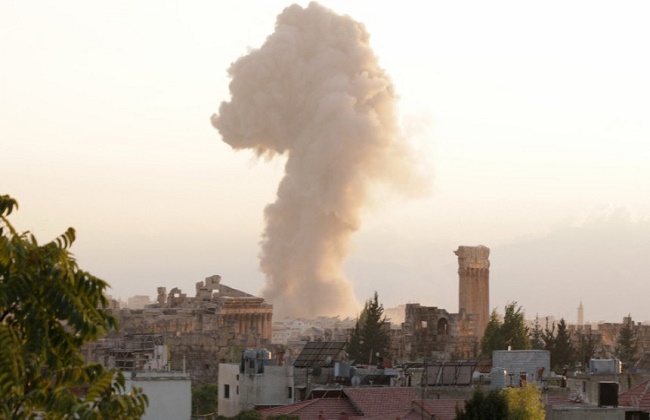
As Israel continues its siege on the southern borders of Lebanon, concerns among humanitarian organizations grow as the frequency of attacks rise. Lebanon’s Ministry of Public Health reports that approximately 2,169 people have been killed and over 10,212 have been injured in the past year. Humanitarian Coordinator for Lebanon, Imran Riza, has described this conflict as one of the deadliest in recent memory.
This morning, the Lebanese Red Cross confirmed that an airstrike in northern Lebanon ordered by the Israeli Defense Forces (IDF) killed 18 people and left others with critical injuries. This attack took place in Aitou, which has a Christian-majority population. Prior to this, the IDF had only targeted southern regions of Lebanon in an effort to depose the Iran-backed militant group, Hezbollah.
On October 10, a barrage of airstrikes hit Beirut’s central district, one of the most populous in the country, without warning. This resulted in over 22 deaths and hundreds of people injured, marking the third significant attack on Beirut since September 23. Despite the IDF’s past claims that the attacks were only intended to target Hezbollah military operations, the recent hostilities have grown increasingly indiscriminate, targeting densely populated areas.
The Office for the Coordination of Humanitarian Affairs (OCHA) confirmed that numerous ambulances and hospitals had been affected, with health workers becoming part of the growing death toll.The World Health Organization (WHO) confirmed in a report last Friday that over 94 health workers have been killed since the start of this conflict. “The protection of civilians and healthcare is a legal and moral imperative that must be upheld. Attacks on health care cannot continue to be one of the defining marks of conflict in this region”, said Hanan Balkhy, WHO Regional Director for the Eastern Mediterranean.
In a statement last Sunday, the UN Interim Force in Lebanon (UNIFIL) reported that two army tanks commissioned by the IDF forcibly entered Lebanon’s southern borders, destroying the main gate of a post in Ramyah. UN Secretary-General António Guterres criticized the IDF stating that attacks on UNIFIL and other peacekeeping entities constitute crimes of war. “UNIFIL personnel and its premises must never be targeted. Attacks against peacekeepers are in breach of international law, including international humanitarian law”, stated Farhan Haq, Deputy Spokesman for the Secretary-General.
UNIFIL responded to the IDF stating, “For the fourth time in as many days, we remind the IDF and all actors of their obligations to ensure the safety and security of UN personnel and property and to respect the inviolability of UN premises at all times”. They added that Israeli troops had impeded “critical” relief efforts in Meiss El Jabel.
Benjamin Netanyahu, the prime minister of Israel, has been widely criticized by world leaders and humanitarian organizations for facilitating war crimes targeting civilians and aid workers. On October 5, French president Emmanuel Macron expressed concern that conditions in Lebanon would grow as dire as they are in Gaza. U.S. president Joe Biden has also voiced frustration in response to Netanyahu’s denial to secure a ceasefire and urged Israel to “minimize harm” to Lebanese civilians.
In response, Netanyahu stated that for any possibility of peace, Lebanon must purge itself of Hezbollah operations. “You have an opportunity to save Lebanon before it falls into the abyss of a long war that will lead to destruction and suffering like we see in Gaza”, said Netanyahu.
Conditions in Lebanon are expected to grow more dire in the coming winter months. According to Riza, approximately 80 percent of all displacement shelters in Lebanon are at full capacity, with the remainder of unhoused civilians taking refuge on the streets or in public centers, such as churches. Assessments are currently underway in an effort to gauge the needs of displaced persons who are not housed by shelters.
Despite continued hostilities and access challenges, the UN is currently delivering aid to affected communities wherever it can. The World Food Programme (WFP) has delivered over one million hot meals and 143,000 ready-to-eat kits to 440 displacement shelters. Additionally, WHO has delivered medical supplies for over 650 surgical procedures in six of the major hospitals in Beirut. UNICEF is working to provide clean drinking water, protection, hygiene resources, and psychosocial support.
Approximately 426 million dollars have been pledged by the UN for relief efforts in Lebanon for the next three months. OCHA reported that only 12 percent of the appeal had been funded, with only 51 million dollars having been raised so far. “With this wave of displacement, we see huge needs… the situation is devastating. Lebanon needs more support. What has been offered so far is minimal and does not match the needs. We hope that everybody will be able to scale up their capacity” , stated Othman Belbeisi, the International Organization for Migration’s (IOM) Middle East and North Africa director.
Oritro Karim is a recent graduate from Rochester Institute of Technology and a working illustrator, graphic designer, painter, and writer.


